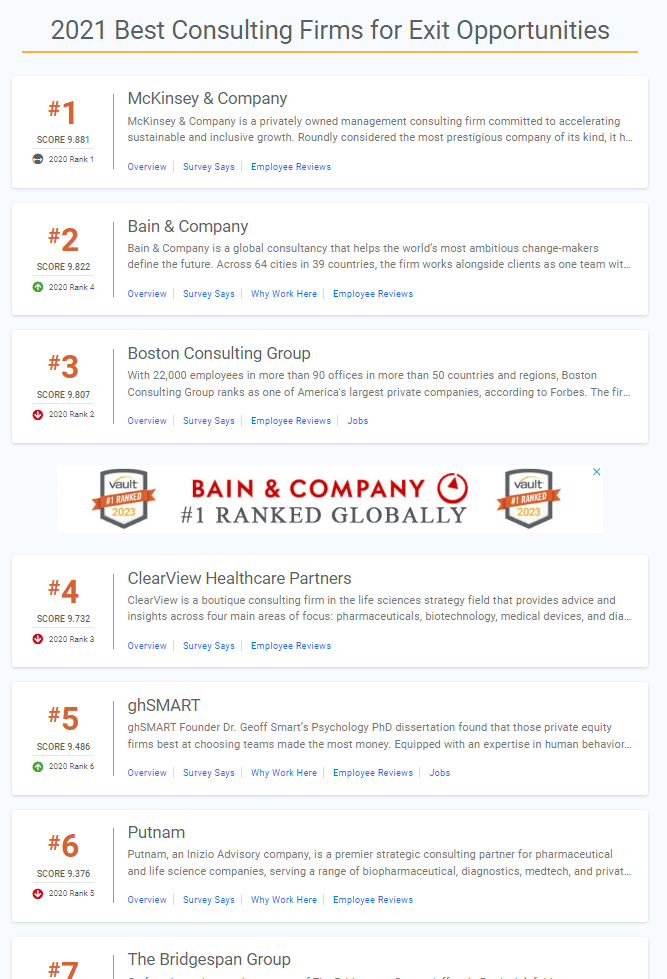In this article, we’ll explore the world of consulting exit opportunities, shedding light on some of the most lucrative career transitions former consultants can embark upon.
The insights are grounded in a comprehensive analysis of over 45,000 LinkedIn profiles, providing you with the most up-to-date and relevant information.
Table of Contents
Key Takeaways
- Former consultants can pivot into almost any industry and roles due to their diverse skill sets and problem-solving experience gained from working with top organizations.
- The technology sector is a top choice for ex-consultants, with tech giants like Google, Amazon, Microsoft, and Meta employing a significant number of alumni from renowned consulting firms (MBB). This is mainly due to the need of the FAANG to hire people with a capacity to analyze a large amount of data.
- Common career paths for former consultants include roles in investment management, entrepreneurship, strategy roles and positions in non-profit organizations.
- Thanks to their skills, connections, and the prestigious consulting firms on their resumes, ex-consultants often enter new industries at senior levels and experience faster promotions.
Related article:
Pros and Cons of Leaving a Consulting Career
Before diving into consulting exit opportunities, let’s explore the pros and cons of departing from a consulting firm:
Pros of leaving a consulting career
1. Diverse Career Paths: Leaving consulting opens doors to various industries and roles, allowing you to explore your interests and passions.
2. Expertise: You can leverage your problem-solving skills, adaptability, and analytical abilities in new and exciting ways to develop a deep expertise in a subject you like.
3. Better work-life balance: The consulting industry’s demanding hours can be challenging to sustain over a long period of time.
Cons of leaving a consulting career
1. Pressure and Expectations: Former consultants often face high expectations and performance pressure in their new roles.
2. Loss of Prestige: Consulting firms, especially top-tier ones, often carry significant prestige in the business world. Leaving the consulting industry may result in a perceived loss of prestige or a prestigious job title on your resume.
3. Adaptation Challenges: Transitioning from a structured, fast-paced, and intellectually stimulating consulting environment to a new industry or role can be challenging. You may find it difficult to adapt to a different work culture, pace, or set of expectations, potentially leading to a period of adjustment and uncertainty as you settle into your new career path. And it may take time to establish yourself in a new field.
What Makes Ex-Consultants Attractive to Hire?
Non-consulting corporations and public organizations are keen on hiring former consultants for several compelling reasons.
These professionals bring a unique set of qualities to the table, making them highly sought-after candidates:
Data Analysis Expertise: Consultants excel at analyzing vast amounts of data, a skill highly valued in sectors like technology and finance.
Problem-Solving Abilities: Former consultants are adept problem solvers, making them valuable assets in decision-making and strategy development.
Strategic Thinking: Consultants possess strategic thinking capabilities, which are crucial for businesses navigating complex challenges.
Leadership Skills: Consulting experience hones leadership qualities, making ex-consultants natural leaders in various roles.
What Are the Consulting Exit Opportunities?
Let’s dive into some of the most prominent consulting exit opportunities, providing insights into key responsibilities, expected salaries (in the US), and sample titles for each option:
Finance Roles
Corporate Finance
Key Responsibilities: Managing an organization’s financial activities, including budgeting, forecasting, and financial analysis.
Expected Salary: Average salary ranges from $90,000 to $130,000.
Sample Title: Financial Analyst
Private Equity
Key Responsibilities: Evaluating investment opportunities, managing portfolio companies, and maximizing investor returns.
Expected Salary: Compensation varies but often includes a base salary and a significant bonus totaling six figures or more.
Sample Title: Associate, Private Equity
Venture Capital
Key Responsibilities: Identifying and investing in promising startups, providing strategic guidance to portfolio companies.
Expected Salary: Associates can earn between $100,000 and $200,000 or more annually.
Sample Title: Associate, Venture Capital
Hedge Funds
Key Responsibilities: Managing investments, conducting research, and optimizing portfolio performance.
Expected Salary: Compensation can range widely but often includes a base salary and performance-based bonuses.
Sample Title: Hedge Fund Analyst
Asset Management & Equity Research
Key Responsibilities: Analyzing financial markets, managing investment portfolios, and conducting equity research.
Expected Salary: Salaries typically range from $80,000 to $150,000 or more.
Sample Title: Investment Analyst
Strategy Roles
Corporate Strategy
Key Responsibilities: Developing and executing strategic plans to drive an organization’s growth and competitiveness.
Expected Salary: Salaries vary but often range from $90,000 to $150,000.
Sample Title: Strategy Manager
Business Development
Key Responsibilities: Identifying new business opportunities, negotiating partnerships, and driving revenue growth.
Expected Salary: Compensation can range from $80,000 to $140,000 or more.
Sample Title: Business Development Manager
Chief of Staff
Key Responsibilities: Serving as a key advisor to top executives, managing special projects, and streamlining operations.
Expected Salary: Salaries typically range from $100,000 to $160,000 or higher.
Sample Title: Chief of Staff
Technology Roles
Product Management
Key Responsibilities: Leading the development and launch of new products, aligning them with market needs.
Expected Salary: Salaries for product managers often range from $100,000 to $150,000 or more.
Sample Title: Product Manager
Marketing roles
Product Marketing
Key Responsibilities: Crafting and executing marketing strategies for products, understanding market needs, and ensuring product success through effective positioning and messaging.
Expected Salary: Salaries for product marketing managers typically range from $80,000 to $140,000 or more, depending on experience and the organization.
Sample Title: Product Marketing Manager
Marketing Analytics
Key Responsibilities: Utilizing data analytics and insights to optimize marketing campaigns, measure ROI, and make data-driven decisions.
Expected Salary: Salaries in marketing analytics often range from $70,000 to $130,000, with variations based on experience and industry.
Sample Title: Marketing Analyst
Marketing Operations
Key Responsibilities: Overseeing the planning and execution of marketing campaigns, managing marketing technology, and ensuring the efficient functioning of marketing teams.
Expected Salary: Salaries for marketing operations roles can vary widely, typically ranging from $70,000 to $130,000 or more.
Sample Title: Marketing Operations Manager
Other Consulting Roles
In-House Consulting
Key Responsibilities: Providing strategic advice and consulting services within a larger organization.
Expected Salary: Compensation varies based on the organization but often aligns with consulting industry standards.
Sample Title: In-House Consultant
Freelance Consulting
Key Responsibilities: Offering independent consulting services to clients across diverse industries.
Expected Salary: Earnings can vary significantly based on client projects and rates.
Sample Title: Freelance Consultant
Entrepreneurial Experience & Start-Up
Founder & CEO
Key Responsibilities: Launching and leading your own business venture, from ideation to execution.
Expected Salary: Earnings are highly variable and depend on the startup’s success.
Sample Title: CEO and Founder
Chief Operating Officer (COO)
Key Responsibilities: Overseeing day-to-day operations, driving growth, and ensuring the organization’s efficiency.
Expected Salary: COOs can earn salaries ranging from $100,000 to $250,000 or more.
Sample Title: Chief Operating Officer
Non-Profit Organizations, NGOs, & Public Sector
Governments often deal with complex issues like economic policies, efficiency improvement, IT system implementation, and organizational changes.
Non-profit organizations also have their own unique challenges, such as fundraising, governance issues, strategic planning gaps, and logistical problems.
If you work with them after your career in consulting, you may be responsible for tasks like donor research, fundraising training, campaign strategy development, and support for their growth.
Get 4 Complete Case Interview Courses For Free

You need 4 skills to be successful in all case interviews: Case Structuring, Case Leadership, Case Analytics, and Communication. Join this free training and learn how to ace ANY case questions.
Top consulting firms by exit opportunities
Our friends from Vault.com have built an extensive ranking of the best consulting firms for exit opportunities.
It’s unsurprising: you can’t be wrong if you work at firms such as McKinsey, BCG, or Bain & Company.

Source: vault.com
Frequently Asked Questions
What is the best exit opportunity for consulting?
The best exit opportunity for consulting largely depends on your individual career goals and interests.
However, corporate finance roles, such as corporate finance, private equity, venture capital, and hedge funds, often offer attractive prospects with competitive salaries.
These roles allow you to leverage your consulting experience in financial decision-making and investment management.
Ultimately, the best exit opportunity is one that aligns with your passion, skills, and long-term career objectives.
What are the exit paths for consulting?
Exit paths for consulting are diverse and abundant, offering professionals many options.
These paths include entering corporate finance, exploring strategy roles, venturing into technology positions, delving into other consulting roles such as in-house or freelance consulting, pursuing entrepreneurial endeavors, contributing to non-profit organizations, NGOs, or the public sector, and even transitioning into academia.
Each exit path presents unique opportunities and challenges, making it essential to align your choice with your career aspirations and interests.
Consulting equips you with valuable skills that can be applied across various industries, making your transition into these exit paths both feasible and rewarding.
Where do consultants work after leaving consulting?
After leaving consulting, consultants often find employment in a wide range of sectors and industries.
Many former consultants secure positions in prominent roles within Fortune 500 corporations, leveraging their consulting experience to excel in business unit management, executive leadership, or specialized functions.
Others venture into finance, joining private equity firms, hedge funds, or investment management roles.
Some explore opportunities in the technology sector, while some opt for entrepreneurship, launching startups, or joining existing ones.
Additionally, consultants may choose to work in non-profit organizations, governmental bodies, or academic institutions, contributing their expertise to address complex challenges in these sectors.
The options are diverse, and the choice typically depends on individual career goals and preferences.
Consulting Exit Opportunities: Final Words
In conclusion, the world of consulting exit opportunities is vast and promising.
As a former consultant, you possess a unique skill set and experience that make you an attractive candidate for various roles across various industries.
Whether you choose to delve into finance, strategy, technology, entrepreneurship, or non-profit work, your consulting background will serve as a valuable asset on your journey to success.
Consider your goals, interests, and aspirations as you embark on your next career path, and leverage the insights provided here to make informed decisions.
Consulting exit opportunities await, ready to propel you toward a rewarding and fulfilling career beyond the consulting realm.
Get 4 Complete Case Interview Courses For Free

You need 4 skills to be successful in all case interviews: Case Structuring, Case Leadership, Case Analytics, and Communication. Join this free training and learn how to ace ANY case questions.
